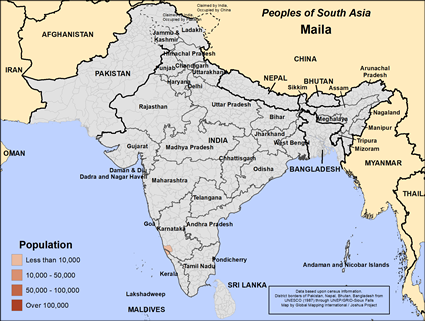Maila in India

Send Joshua Project a photo
of this people group. |

Map Source:
People Group data: Omid. Map geography: UNESCO / GMI. Map Design: Joshua Project
|
| People Name: | Maila |
| Country: | India |
| 10/40 Window: | Yes |
| Population: | 2,800 |
| World Population: | 2,800 |
| Primary Language: | Tulu |
| Primary Religion: | Hinduism |
| Christian Adherents: | 0.00 % |
| Evangelicals: | 0.00 % |
| Scripture: | New Testament |
| Ministry Resources: | Yes |
| Jesus Film: | Yes |
| Audio Recordings: | Yes |
| People Cluster: | South Asia Dalit - other |
| Affinity Bloc: | South Asian Peoples |
| Progress Level: |
|
Introduction / History
The Hindu Maila people live primarily in southern India, with a significant presence in Karnataka and Kerala. They speak Tulu. Historically, they have worked in occupations related to cleaning and sanitation. Over time, many Maila families have continued these roles, while others have moved into different types of manual labor.
What Are Their Lives Like?
The majority of Maila families depend on manual labor for their livelihood. Traditionally, they have worked in cleaning, sweeping and sanitation jobs. In rural areas, Maila families also work in agricultural labor on farms owned by wealthier landowners. Some families have moved to urban areas and found employment in various service-related sectors.
The Maila people live in close-knit communities, often in small villages or urban slums. Housing is typically modest, with homes made from brick, mud and thatch. Extended families often live together, sharing responsibilities and supporting one another in daily tasks. Despite facing economic hardships, the Maila community remains resilient, finding ways to support their families and pursue better opportunities.
What Are Their Beliefs?
The Maila people practice Hinduism, observing the same religious festivals and rituals as other Hindu communities. They worship deities such as Vishnu, Shiva and Durga and participate in festivals like Diwali and Holi. Temples and local shrines are important places for worship and community gatherings, where Maila families come together for religious ceremonies and prayers.
In addition to temple worship, the Maila people often perform specific rituals tied to their work and daily life. They may offer prayers for protection, good fortune, and the well-being of their families. These religious practices provide a sense of continuity in their lives.
What Are Their Needs?
The Maila people face significant challenges related to economic development, social mobility and access to basic services like healthcare and education. Many Maila families lack access to formal education, limiting their opportunities for upward mobility. Providing better educational resources and expanding access to schooling for children in Maila would help create more economic opportunities for future generations. Healthcare is another critical need, as many Maila communities live in areas with limited access to medical services. Improving access to healthcare facilities, particularly in rural and underserved urban areas, would greatly benefit the community.
The issue of economic stability remains crucial in Maila. Most Maila families depend on low-paying jobs, making it challenging to break free from the cycle of poverty. Implementing programs that provide vocational training and support for small businesses could assist Maila families in diversifying their sources of income and attaining greater financial independence.
Prayer Points
Pray for the Holy Spirit to show himself far more powerful than any other spirit.
Pray for signs and wonders to take place and that this would testify of the power and authority of the name of Jesus.
Pray for wisdom in discipleship with rapid multiplication of disciples and house churches.
Pray for bold, compassionate workers to be sent to them.
Pray for revival to spread through Maila communities, transforming them by the love of Christ.